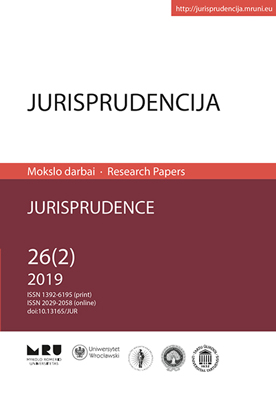IŠPLĖSTINIS TURTO KONFISKAVIMAS DEMOKRATINĖJE VISUOMENĖJE
EXTENDED CONFISCATION OF PROPERTY IN A DEMOCRATIC SOCIETY
Author(s): Romualdas DrakšasSubject(s): Law, Constitution, Jurisprudence, Criminal Law, Criminology
Published by: Mykolas Romeris University
Keywords: organized crime; criminal liability; extended confiscation of property; criminal law principles; measure of punitive effect; principle of justice;
Summary/Abstract: The article deals with the problematic aspects of the extended confiscation. Having assessed the institute of the extended confiscation of property through its objectives and compliance with the fundamental principles of criminal law, the author argues that when a court is convinced that the property in question is acquired from a criminal offense and the third parties acquire property from the suspected or accused person directly or indirectly, for example through an intermediary, including cases where the offense was committed on their behalf or for their benefit, and the offender tries to prevent the confiscation of property, such property may be confiscated in accordance with the 72nd article of the Criminal Code of the Republic of Lithuania and not the article 723. At the same time, the author raises doubts about the quality of the ongoing legislation process. In the author’s view, the legislative process today naturally raises a rhetorical question: what is its purpose – to increase the protection of human rights or to raise new threats to the same rights. Legal regulation of the extended confiscation of property shows that threats to human rights may arise not from the interpretation and practical application of the law but from the legislator itself. It should be emphasized that no other branch of law provides for such serious consequences as criminal law, and therefore, punishment can not be based solely on popular scientific publications or elementary journalistic research. The norms and principles enshrined in the Constitution and in the international law must be respected in the legislative process. All public life problems cannot be solved by criminal law alone.
Journal: Jurisprudencija
- Issue Year: 26/2019
- Issue No: 2
- Page Range: 326-351
- Page Count: 26
- Language: Lithuanian

